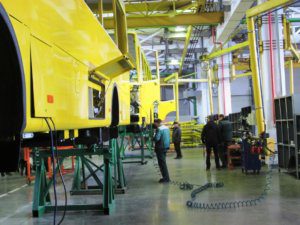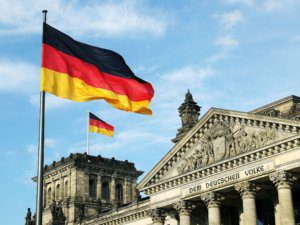
The Bogdan Corporation has issued its first electric truck ERCV27 for loading solid household waste under a contract with Denmark’s Banke Electromotiv.
The truck was presented on November 22 at the Bogdan Motors automobile plant in Lutsk with the participation of Ukrainian Infrastructure Minister Volodymyr Omelyan.
“We are gradually refuting the widespread opinion that Ukraine is exclusively agrarian. The presented electric transport is fully designed and created in Ukraine. It will be “Made in Ukraine” in the European Union,” the ministry’s press service reported on its website, citing Omelyan as saying.
The press service of the Bogdan Corporation said that the mass production of cars will begin after their certification in Denmark.
As reported, the agreement signed between the Bogdan Motors plant in Lutsk and Banke Electromotiv for the designing and production of garbage collection trucks signed in the spring of this year involves the manufacture of 15 trucks. In general, Banke Electromotive requires about 200 trucks a year.
“As long as European companies order ecofriendly special vehicles for the removal of household waste from a Ukrainian manufacturer, our state is lagging behind in this matter. Although the Bogdan’s electric truck with its characteristics is ahead, and the company is ready to produce it for Ukrainian cities,” the corporation’s press service said.
In turn, according to the press service of the Infrastructure Ministry, Omelyan pointed out the importance of creating conditions for the development of electric transport in Ukraine as soon as possible.
“We have visited a workshop that is ready for operation, we just need to start it. To do this, we need to create conditions for restoring the automotive industry in Ukraine. In particular, we initiated an electric bus at the Boryspil airport, and I hope it will be Ukrainian electric bus,” the press service said, quoting Omelyan.

The Hungarian company New Work Serviced Offices on November 16 opened the first co-working space in Ukraine, an object of 960 square meters located on the third floor of the Globus 2 shopping center on the Independence Square in Kyiv.
According to the press service of the trade center, the New Work Labs Globus smart space includes meeting rooms, a conference room for up to 60 people, an event area, skype rooms, a kitchen, recreational islands, and its own coffee bar.
“Residents receive individual access to the space through a mobile application, thanks to the use of the KISI system,” the report says.
In addition, co-working residents in the Globus shopping center will be able to work not only in the Kyiv location, but also in Budapest, Warsaw, and Prague. The company currently manages 12 locations in Eastern Europe.
According to the press service, the co-working service offers tariff plans from four hours a day to monthly tariffs with a fixed individual workplace or a private office for the whole team. At the same time, it is possible to work in co-working 24/7.
New Work Labs (Hungary) was established in 2012 and is engaged in the provision of co-working space for the needs of growing companies and individuals.

Ukrainian Prime Minister Volodymyr Groysman will pay a working visit to Germany from November 28 to 29 to take part in a business forum there.
“Ahead of my visit to Germany, I have met with journalists from Die Zeit. We spoke about our mutual relations and plans for 2019,” Groysman wrote in a tweet on Twitter.
In a comment to Interfax-Ukraine news agency, the prime minister’s press secretary Vasyl Riabchuk said the working visit will take place from November 28 to 29.
He said Groysman will leave for Germany on Wednesday, November 28, after a meeting of the government.
Riabchuk said the Ukrainian prime minister will hold several bilateral meetings there and attend the opening of a business forum on November 29.

The Hungarian low cost carrier WizzAir in Ukraine plans to launch flights on two new directions – from Krakow (Poland) to Kyiv from April 5 and Kharkiv from September 16, 2019.
“Two new Airbus A321 aircraft will support the work of twelve new routes from Krakow to London, Kyiv, Bari, Catania, Larnaca, Nice, Turku, Billund, Doncaster, Kharkiv, Oslo, and Kutaisi,” the airline reported.
According to information on the company’s website, flights to Kyiv will begin from April 5, 2019, to Kharkiv from September 16, 2019. The schedule for both flights is available until October 25, 2019, prices start from UAH 609.
Kyiv-Krakow-Kyiv flights will be operated on Mondays, Wednesdays, Fridays and Sundays (departure to Krakow at 18:15, back at 19:20 local time), Kharkiv-Krakow-Kharkiv flights on Mondays and Fridays (departure to Krakow at 17:45, back at 14:05 local time).